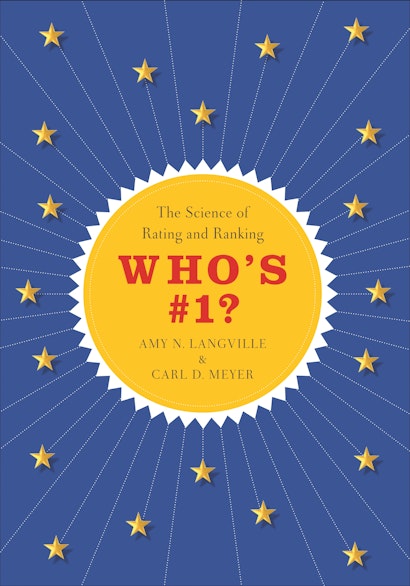A website’s ranking on Google can spell the difference between success and failure for a new business. NCAA football ratings determine which schools get to play for the big money in postseason bowl games. Product ratings influence everything from the clothes we wear to the movies we select on Netflix. Ratings and rankings are everywhere, but how exactly do they work? Who’s #1? offers an engaging and accessible account of how scientific rating and ranking methods are created and applied to a variety of uses.
Amy Langville and Carl Meyer provide the first comprehensive overview of the mathematical algorithms and methods used to rate and rank sports teams, political candidates, products, Web pages, and more. In a series of interesting asides, Langville and Meyer provide fascinating insights into the ingenious contributions of many of the field’s pioneers. They survey and compare the different methods employed today, showing why their strengths and weaknesses depend on the underlying goal, and explaining why and when a given method should be considered. Langville and Meyer also describe what can and can’t be expected from the most widely used systems.
The science of rating and ranking touches virtually every facet of our lives, and now you don’t need to be an expert to understand how it really works. Who’s #1? is the definitive introduction to the subject. It features easy-to-understand examples and interesting trivia and historical facts, and much of the required mathematics is included.
"[A] thorough exploration of the methods and applications of ranking for an audience ranging from computer scientists and engineers to high-school teachers to 'people interested in wagering on just about anything'."—Nature Physics
"Who's #1 provides a fascinating tour through the world of rankings and is highly recommended."—Richard J. Wilders, MAA Reviews
"[T]he book . . . provide[s] an excellent, accessible, and stimulating discussion of the material it does cover. Overall, the book makes a valuable addition to the canon of rating and ranking."—David J. Hand, Journal of Applied Statistics
"This book provides an interesting overview of ranking various sports teams, chess players, politicians, and the like in real-life circumstances, which typically involve serious constraints on the time available to find the optimal ranking."—Choice
"The book could be used to supplement a course on linear algebra and/or numerical linear algebra. . . . The book could also be used as the basis for a short topics course or undergraduate research project on ranking, or it could be used in a modeling class as an example of how mathematical modeling is done. In addition to describing the mathematics of ranking, the book is full of interesting tidbits that add to the pleasure of its reading."—James Keener, SIAM Review
"When I started this book I knew very little about American football. I was little the wiser after finishing it, but I had an excellent understanding of various methods used in the obtaining of the ranking of teams and their interrelationships. Langville and Meyer are to be commended for this collection, and anyone who is more conversant with North American sports than I am will most certainly be stimulated by reading Who's #1?"—Andrew I. Dale, Notices of the AMS
"Readers will find many interesting ideas as they grapple with the complexities of the science of rating and ranking."—Bob Horton, Mathematics Teacher
"[T]his book is a call to consciousness on the relevance of rating and ranking as well as an enjoyable start-up guide from the point of view of algebraic methods."—Francisco Grimaldo Moreno, JASSS
"This book is a great introduction to the field (including its constituent parts in linear algebra and data mining) and contains enough depth to be used as a supplemental book in a data mining course or as a jumping off point for an interested researcher. . . . Overall this is a very nice, well written book that could be use in multiple ways by a wide variety of audiences."—Nicholas Mattei, SigAct News
"The profit the scientometrics community can gain from this book is an indirect one: an attitude how to compile a systematic collection of potential methods, how to select carefully using theoretical tests and empirical examples and how to combine methods to get a comprehensive, multidimensional rating and ranking system. In this sense, it is a highly recommended reading for all readers of the journal Scientometrics."—Andras Schubert, Scientometrics
"This book is an excellent read for everyone; readers might be sports enthusiasts, social choice theorists, mathematicians, computer scientists, engineers, and college and high school teachers. Teachers will find quite an easy way to extract material for a short module."—Valentina Dagiene, Zentralblatt MATH
"Who's #1? is an excellent survey of the fundamental ideas behind mathematical rating systems. Once a realm of sports enthusiasts, ranking things is becoming a vital tool in many information-age applications. Langville and Meyer compare and contrast a variety of models, explaining the mathematical foundations and motivation. Readers of this book will be inspired to further explore this exciting field."—Kenneth Massey, Massey Ratings
"Langville and Meyer provide a rigorous yet lighthearted tour through the landscape of ratings methodologies. This is an enjoyable read that looks at ratings through the lens of sports, but also touches on how ratings affect our everyday lives through movies, Web search, online shopping, and other applications."—Chris Volinsky, member of the winning Netflix Prize team
"Who's #1? provides a much-needed synthesis of the methods used for ranking and rating things like sports teams, movies, politicians, and more. There is a ton of interest in this topic, and readers now have one place to look for a comprehensive treatment of the different approaches."—Wayne L. Winston, author of Mathletics: How Gamblers, Managers, and Sports Enthusiasts Use Mathematics in Baseball, Basketball, and Football
"This highly accessible book gives readers a comprehensive account of the different mathematical ranking techniques across many different disciplines, and will appeal to everyone from researchers to sports statistics junkies."—Sep Kamvar, author of Numerical Algorithms for Personalized Search in Self-organizing Information Networks


